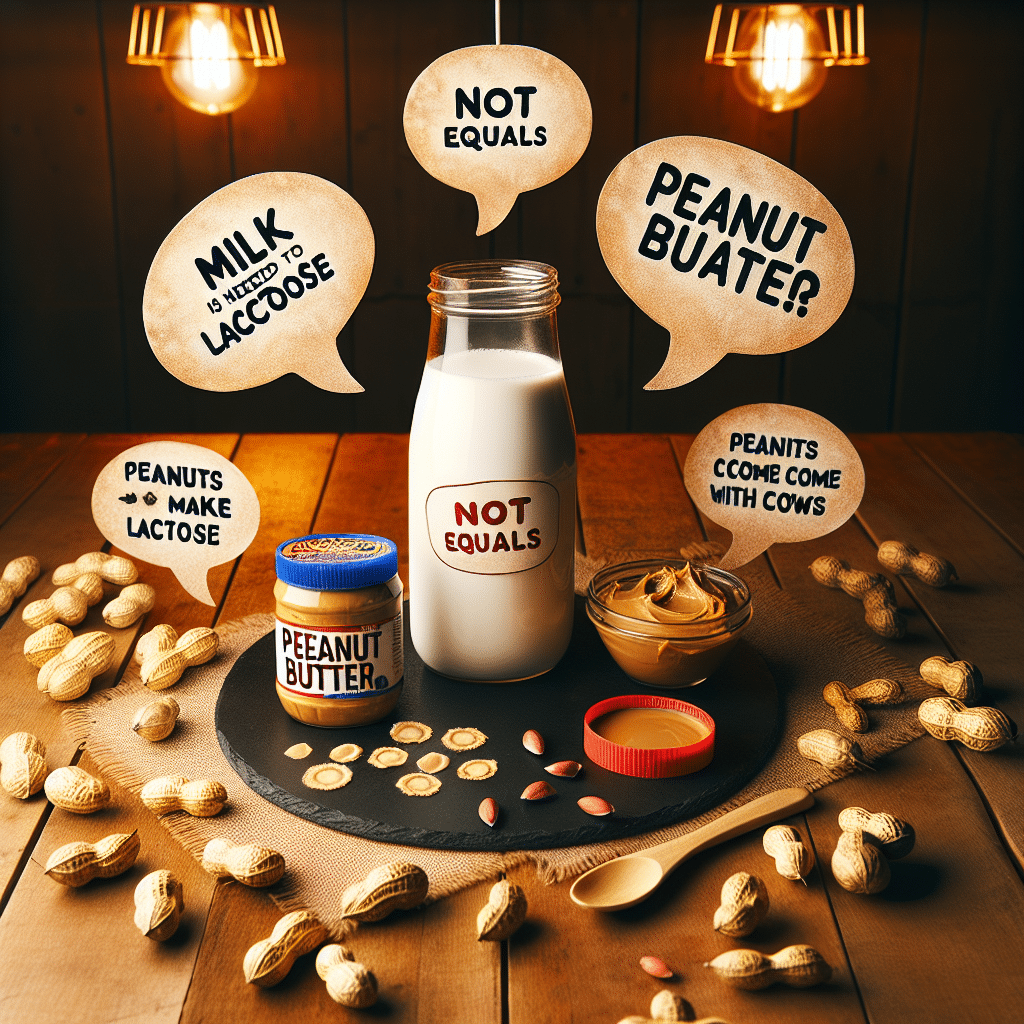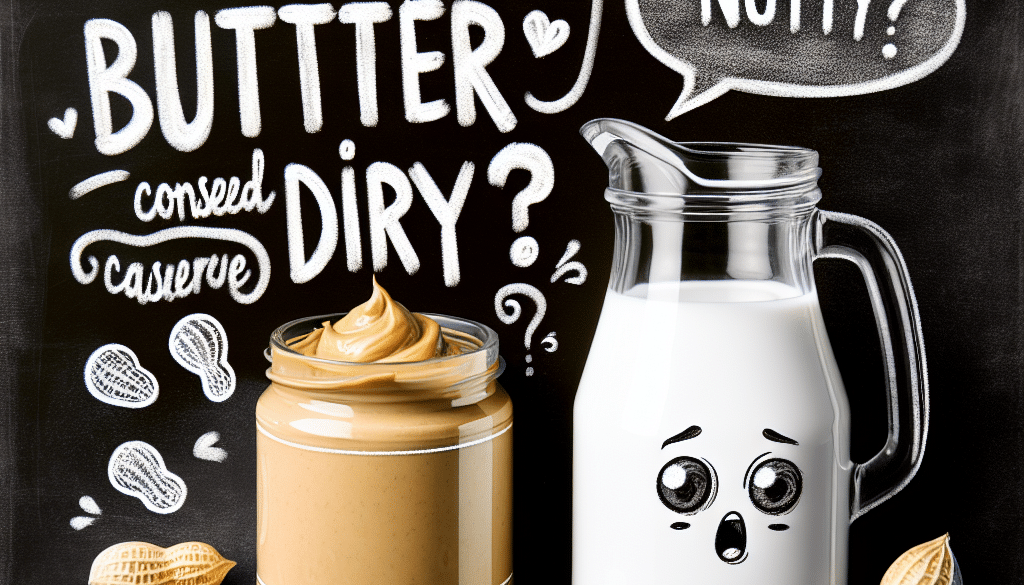Is Peanut Butter Considered Dairy: Nutty Misconceptions
-
Table of Contents
- Is Peanut Butter Considered Dairy? Debunking Nutty Misconceptions
- Understanding Dairy: A Brief Overview
- Peanut Butter: The Nutty Truth
- Why the Confusion?
- Nutritional Profile of Peanut Butter
- Common Misconceptions About Peanut Butter
- Choosing the Right Peanut Butter
- Case Studies and Statistics
- Conclusion: Clearing Up the Dairy Dilemma
- Discover ETprotein’s Plant-Based Protein Products
Is Peanut Butter Considered Dairy? Debunking Nutty Misconceptions

When it comes to understanding food categories, there can be a lot of confusion. One common question that arises is whether peanut butter falls under the category of dairy products. This article aims to clear up any misconceptions and provide a comprehensive look into what constitutes a dairy product and where peanut butter stands in the dietary landscape.
Understanding Dairy: A Brief Overview
Dairy products are derived from the milk of mammals, such as cows, goats, and sheep. They include a wide range of foods like milk, cheese, yogurt, butter, and cream. Dairy products are known for being rich sources of calcium, vitamin D, and protein. However, they can also be sources of saturated fat and cholesterol, which have been linked to various health concerns when consumed in excess.
Peanut Butter: The Nutty Truth
Peanut butter, on the other hand, is made from ground peanuts, which are legumes and not related to dairy. The basic ingredients of peanut butter are peanuts, oil, and sometimes salt or sugar. It does not contain any milk or milk-derived products, making it naturally dairy-free and suitable for those with lactose intolerance or milk allergies.
Why the Confusion?
The confusion around peanut butter and dairy may stem from its creamy texture and the fact that it is often found in the same aisle as dairy products in grocery stores. Additionally, peanut butter is sometimes used in recipes as a substitute for butter, which is a dairy product. However, despite these associations, peanut butter is not a dairy product.
Nutritional Profile of Peanut Butter
Peanut butter is a nutrient-dense food that offers a variety of health benefits. It is a good source of:
- Protein
- Healthy fats (monounsaturated and polyunsaturated fats)
- Vitamins and minerals such as magnesium, potassium, and zinc
- Dietary fiber
These nutrients contribute to heart health, muscle building, and overall well-being. However, it’s important to consume peanut butter in moderation due to its high calorie and fat content.
Common Misconceptions About Peanut Butter
Let’s address some common myths and clarify the facts:
- Myth: Peanut butter is high in cholesterol.
Fact: Peanuts contain no cholesterol. Any cholesterol present in commercial peanut butter products would come from added animal-derived ingredients, which are not standard.
- Myth: Peanut butter is a good source of dairy calcium.
Fact: Peanut butter does not contain dairy calcium. Some brands may fortify their products with calcium, but this is not the norm.
- Myth: Peanut butter should be avoided by vegans.
Fact: Pure peanut butter is vegan-friendly as it contains no animal products.
Choosing the Right Peanut Butter
When selecting peanut butter, it’s important to read labels carefully. Some brands may add ingredients like whey or casein, which are dairy derivatives. For those avoiding dairy, look for labels that indicate the product is vegan or dairy-free. Additionally, opting for natural or organic peanut butter can ensure you’re getting a product with minimal additives.
Case Studies and Statistics
Research has shown that including nuts and nut butters in your diet can have positive health outcomes. A study published in the Journal of the American Medical Association found that consuming nuts and peanut butter reduced the risk of developing type 2 diabetes in women. Another study in the British Journal of Nutrition highlighted that regular nut consumption is associated with a reduced risk of cardiovascular disease.
Conclusion: Clearing Up the Dairy Dilemma
In conclusion, peanut butter is not a dairy product. It is a plant-based food made from peanuts and is naturally free of milk and milk derivatives. While it shares some textural qualities with dairy products and can be found in the same section of the grocery store, it is a distinct food item with its own nutritional benefits. By understanding the differences between dairy products and peanut butter, consumers can make informed dietary choices that align with their health needs and preferences.
Discover ETprotein’s Plant-Based Protein Products
If you’re looking for high-quality plant-based protein options, consider ETprotein’s range of products. ETprotein is a reputable protein Chinese factory manufacturer and supplier, offering a variety of organic bulk vegan protein and plant proteins. Their products, including Organic rice protein, clear rice protein, pea protein, clear pea protein, pumpkin seed protein, sunflower seed protein, mung bean protein, and peanut protein, are non-GMO and allergen-free, making them an excellent choice for those seeking dairy-free protein sources.
ETprotein caters to a diverse range of industries, providing solutions for nutraceuticals, pharmaceuticals, cosmeceuticals, veterinary, as well as food and beverage finished product distributors, traders, and manufacturers. With a commitment to quality and customer satisfaction, ETprotein is a trusted partner for your protein needs.
About ETprotein:
ETprotein, a reputable protein Chinese factory manufacturer and supplier, is renowned for producing, stocking, exporting, and delivering the highest quality organic bulk vegan protein and plant proteins. They include Organic rice protein, clear rice protein, pea protein, clear pea protein, pumpkin seed protein, sunflower seed protein, mung bean protein, peanut protein etc. Their offerings, characterized by a neutral taste, non-GMO, allergen-free attributes, cater to a diverse range of industries. They serve nutraceutical, pharmaceutical, cosmeceutical, veterinary, as well as food and beverage finished product distributors, traders, and manufacturers across Europe, USA, Canada, Australia, Thailand, Japan, Korea, Brazil, and Chile, among others.
ETprotein specialization includes exporting and delivering tailor-made protein powder and finished nutritional supplements. Their extensive product range covers sectors like Food and Beverage, Sports Nutrition, Weight Management, Dietary Supplements, Health and Wellness Products, and Infant Formula, ensuring comprehensive solutions to meet all your protein needs.
As a trusted company by leading global food and beverage brands and Fortune 500 companies, ETprotein reinforces China’s reputation in the global arena. For more information or to sample their products, please contact them and email sales(at)ETprotein.com today.












